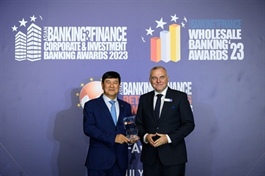Fintech groups and banks linking up for new payment partnerships
Fintech groups and banks linking up for new payment partnerships
Vietnam’s payment fintech landscape is witnessing a surge in partnerships between foreign giants like Apple Pay and local banks, while local payment apps are teaming up with international firms, signalling promising growth prospects for the digital payment sector.
Several lenders such as Vietcombank, Techcombank, and MB Bank last week underwent app updates to include Apple Pay functionality. Their apps, available on the App Store, now explicitly mention support for Apple Wallet, indicating that once Apple Pay launches in Vietnam, users will be able to seamlessly add their credit and debit cards to the digital wallet.
Insights from the tech community at Tinhte.vn seem to hint that Apple Pay might make its official debut in Vietnam imminently, which is expected to give a significant boost to cashless payment methods across the country.
Before Apple Pay, a similar service, Google Wallet, was launched in Vietnam in November 2022. Visa cardholders from ACB, Sacombank, Shinhan Bank, TP Bank, Techcombank, Vietcombank, and VPBank are able to add their cards to Google Wallet, facilitating payments via Android phones or Wear OS devices at locations that accept contactless payments.
Despite being a pioneer in the digital economy in Vietnam, Google Wallet has yet to gain significant traction.
On the flip side, while foreign e-wallets make inroads into Vietnam, local e-wallets are forging alliances with international enterprises.
In late June, VNG-backed ZaloPay unveiled a strategic partnership with Shopify, positioning itself as Vietnam’s pioneer e-wallet provider to integrate with the payment architecture of this foremost global commerce platform.
Through this collaboration, ZaloPay and Shopify aspire to propel the “Brand.com” website model in Vietnam, facilitating enterprises in swiftly embracing the e-commerce trend. This model involves businesses constructing and operating their distinct websites, thus expanding sales avenues alongside the conventional approach of trading through comprehensive e-commerce platforms.
Beyond this, MoMo, despite holding the largest market share, is also actively seeking partnerships with other apps like Baemin, Be, Ahamove, and Gojek to facilitate seamless payments for services on their platform.
The company has also made strategic acquisitions such as Quick.vn, AI startup Pique, and Tin Viet securities company as part of its ambition to establish an open financial ecosystem. The domestic competition is intensifying as foreign players make their presence felt in the market.
In April, MoMo introduced flexible Apple payment methods on the online Apple Store for customers. Going beyond payment capabilities, Apple and MoMo jointly unveiled an instalment service for Apple products. In essence, customers purchasing Apple products like iPhones, iPads, Apple Watches, and an array of accessories can now avail loans through MoMo’s application.
Elsewhere, ZaloPay and DNSE Securities last month jointly launched an inaugural securities account product on e-wallets in Vietnam. With this offering, investors can register and engage in securities trading through DNSE’s Entrade X account, all within the ZaloPay e-wallet platform, eliminating the need for platform-switching.
Le Lan Chi, general director of ZaloPay, highlighted the substantial potential of the Vietnamese stock market, particularly among the young customer demographic.
“The primary goal is to provide comprehensive support and intelligent financial management solutions to customers, enabling them to invest wisely and effectively, even with modest capital resources,” she said.
Reflecting on the potential of Vietnam and Southeast Asia, Kenny Man, co-founder and managing partner of 01Fintech, a Hong Kong-based private equity fund, highlighted the significant number of unbanked individuals in the region. He emphasised the considerable scope for the advancement of digital banking and other financial services like online payments.
“In China, 80 per cent of consumers use e-wallets, whereas the figure is below 40 per cent in the Philippines, Vietnam, and Indonesia. We observe distinct parallels between the current fintech landscape in Southeast Asia and China’s situation a decade ago,” Man told Nikkei Asia last week.
Yet, Man cautioned that the Southeast Asian market differentiates from China’s trajectory.
“Southeast Asia boasts a more diverse landscape, with various players vying for market dominance. There is robust potential in services like buy now, pay later and supply chain financing, encompassing solutions that enable suppliers to receive prompt payment on their invoices,” Man said.



















